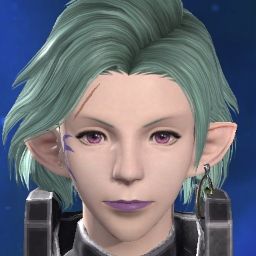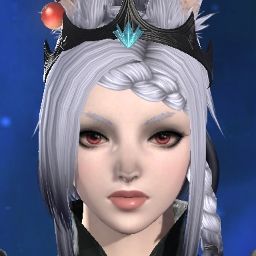Eh, I think it's mostly because ShB is written way before EW. "something not as it seems" is and has always been a thing in ffxiv since it's an on-going story. Just like how hydaelyn "lied" about zodiark back in HW. How the true properties of astral and umbral aether is only known in ShB. How we thought nanamo died in arr, and only revealed to be alive in HW. That's why the encyclopedia of eorzea is even written as "made by the in-game npc" so they could easily retcon or add lore to it.
-
03-01-2022 06:00 PM #311(9)
-
03-01-2022 07:54 PM #312Player

- Join Date
- Sep 2021
- Location
- Solution Eight (it's not as good)
- Posts
- 3,029
- Character
- Ein Dose
- World
- Mateus
- Main Class
- Alchemist Lv 100
Actually, we know that Endwalker was largely stencilled out before Shadowbringers launched. We have heard before that they plan two expansions in advance (hence why the clues of the first Sin Eaters turned up in HW's patches), but we've also heard of late that Emet-Selch's presence in Endwalker was written before they knew he'd be as popular as he is. Since he became popular pretty much instantly on Shadowbringers' launch, that says that they knew the real story behind what Emet was telling when he was telling it to us. It's also shown by the fact that our real first foreshadowing about the dynamis stuff was in 5.0, but not in the MSQ; it's in the Dancer questline.
They aren't writing it literally just before producing it, there's a lot of lead time, and they do very little in the way of retconning (unless it's 1.0 stuff). In fact, of the stuff that you mentioned, going by how we know their writing process actually works...
- Heavensward's patches were being written around when Shadowbringers was being planned (again, the Sin Eaters). That means they had the 'Hydaelyn is a primal' reveal figured out at that point, so they knew when she was saying it that it wasn't the whole truth.
- The 'light and dark aether' thing is an interesting thing where it's not an actual story-relevant detail that was 'retconned', but rather a scientific assumption. But when taking into account that those terms initially came up in 1.0, and we do know that they were actively rewriting 1.0's lore details (Thancred's Japanese VA accidentally revealed to us that when he was cast the Ascians had a different backstory), and then adding in that 'planned two expansions in advance' thing... yeah, this one probably was a retcon, but it's not exactly a big one. This didn't change anything at all.
- Nanamo's 'death' was literally during the Heavensward leadup (HW had been announced for five months at the time), they absolutely didn't write the Parting Glass with the notion that she'd stay dead, because they were producing those cutscenes and HW at the same time.
- I don't think the Encyclopedia Eorzea is written in-universe to protect them in case of retcons; it's there to protect us from spoilers (and also because it makes for a more interesting read). Consider that when volume 2 was written, it had a section on the Warriors of Darkness when Shadowbringers was in production; they didn't make the section without that information because they were still deciding it, they did it because they wanted us to find it all out in-game.
(6)Last edited by Cleretic; 03-01-2022 at 08:02 PM.
-
03-01-2022 09:18 PM #313Player

- Join Date
- Jul 2015
- Location
- Meracydia
- Posts
- 3,883
- Character
- Lythia Norvaine
- World
- Gilgamesh
- Main Class
- Viper Lv 100
The story doesn't really go into detail into how Zodiark 'works' outside of a rough explanation that as a darkness primal (governing activity and growth), He speeds up the celestial aetheric currents surrounding the planet. Perhaps he does it by increasing Etheirys' angular velocity to enhance the Coriolis effect, similar to his Astral Flow boss fight arena mechanic. I can only guess at how darkness affects growth. Does it boost cellular replication, resulting in shorter generation times (and shorter lifespans, with an increased carcinogenic effect?) Either way, we can only guess at how he works. I'm sure that it is more nuanced than 'granter of wishes without any limiting condition' (unless DRK is getting a Wish spell next expansion).
It's also hard to say how well the Ancients actually understood how he worked. At the very least, this was the first time that creation magic was executed on such a massive scale. So while they had a theoretical framework on what they were trying to achieve (speed up celestial currents using the darkness aether), they wouldn't have had any prior experience with it. And to be fair, the Ancients did a lot of things by blind experimentation without understanding the consequences. Remember, the Ascians created the Void completely unintentionally, denying themselves a rejoining. They're definitely not all-knowing.
Either way, the mechanics around Zodiark's summoning haven't really been explored in the story in any depth, so most discussion around Zodiark and the solutions that he provided is much headcanon territory.
If you define an ideologue as merely someone who subscribes to a set of ideologies (it's not quite the same, as the word usually has a negative connotation attached with regards to dogma and zealotry), then everyone is an ideologue. I do think that the Ancients as a group were very much focused on 'concepts' and principles over individuals. You can see this even in their governance, with Convocation members ruling over abstract ideas like 'rhetoric'. There's a really nice segment in Shadowbringers (Lv. 77: 'Return to Eulmore') that highlights the differences between our current society's thinking and the Ancients quite nicely. To Emet, people who aren't Amaurotian aren't 'truly alive', and so it isn't murder to kill them. You see a similar line of thinking when you first enter Elpis as well, where Hyth makes you a cloak from petaloudai and you have the option to question him further on that (i.e. 'You turn living beings into clothing? Just like that?') and his response is along the lines of 'We can always make more petaloudai.' It all makes sense, on a purely logical level. But a mind all logic is like a knife all blade. Aetheric density isn't the only reason why they would have struggled to use dynamis.
The Ancients are very much written as a society of gods, a point rather bluntly reflected in their naming choices. On a very superficial level it sounds exciting (after all, who wouldn't want to have so much power at their disposal?) And then when you start to talk to them about their views on life and other people, you quickly realize that society as a whole is much better off without it. Or not, if you're not the sort of person who gets weighed down by silly things like emotion and sentimentality.(3)
-
03-01-2022 09:57 PM #314Player

- Join Date
- Feb 2021
- Posts
- 3,472
- Character
- Kizuya Katogami
- World
- Cerberus
- Main Class
- Conjurer Lv 81
To be fair that’s what they say. Whether it’s true or not is anyones guess. For all we know they just look back at things they can use. I believe yoshi p did even make the comment that part of the community response to Emet did affect some things regarding him in the story which…very clearly shows lol. The amount of fanservice given to him is immense, especially if you compare it to some other characters who should have had more time in the story compared to him. Either way though i think there’s a lot that points to them not always making things in advance, and i think Endwalker is definitely the major point where people opened their eyes to this.
(8)
-
03-01-2022 11:37 PM #315
-
03-01-2022 11:56 PM #316
Uhh the story explicitly told us they can't use dynamis solely because of their aetheric density. Are you implying they can't use it because they "lack" emotions?
Also, not defending emet's action here, but just want to say that many has theorized that his "sundered aren't truly alive" is kinda his coping mechanism, considering he genuinely sad over his son's passing.
Meanwhile, the sundered: "let's kill and skin this dhamel to make a bag "
(11)
"
(11)
-
03-02-2022 01:15 AM #317Player

- Join Date
- Jul 2015
- Location
- Amaurot
- Posts
- 4,449
- Character
- Tristain Archambeau
- World
- Cerberus
- Main Class
- Black Mage Lv 90
Yeah, or the gorillas in the diadem, or the fates where WOL & co engage in regular slaughter of a variety of life forms, or the souls of beings the RPR avatar chugs down on a routine basis, etc etc. Overflowing with compassion, these sundered.
No, to Emet people who are fractured versions of his people and exist at their expense are not truly alive. Not merely people who aren't "Amaurotian", as if there is no prior chain of events involved here to bring about this situation.
With that said, I agree with this:
(11)Last edited by Lauront; 03-02-2022 at 01:19 AM.
When the game's story becomes self-aware:

-
03-02-2022 01:35 AM #318Player

- Join Date
- Jul 2015
- Location
- Meracydia
- Posts
- 3,883
- Character
- Lythia Norvaine
- World
- Gilgamesh
- Main Class
- Viper Lv 100
Part of what makes that speech in the Ocular so interesting is the non-verbal cues. You can see the obvious emotional disconnect between Emet and everyone else present when he smilingly exclaims that killing millions of sundered people doesn't really count as murder, because he views them all as 'malformed creatures'. He can read the room well enough to be aware that he's just said something very offensive from the awkward silence and shocked reactions, so he quickly changes the topic after, but he still doesn't actually seem to 'get' why his statement was so poorly received.
Emet brings up moral relativism in the same speech, which is what this comes down to. If values are only a matter of personal opinion, then sure, any 'morality' that you put forward is valid. His argument makes perfect sense from a purely logical standpoint, as does your dhamel point. After all, where do you draw the line? And yet people are very naturally able do this on instinct.
If you use that same 'logic' to justify murder out loud in human company, many people (i hope) would instantly and vehemently disagree with you. But not because it's an illogical statement. And this is not really something that you can parse out with logic, either, because like it or not, value systems and empathy are fundamentally emotional-driven entities. I think this is why antisocial personality types can simultaneously get a read on an emotional response and yet find it incomprehensible at the same time. It's kind of like a form of 'common sense', or perhaps the more accurate term here is common sensibility.
Either way, it's just interesting that the while the Ancients are 'human-inspired', there are still elements of their actions and behavior that feel very alien from a human perspective, as the Q+A itself alluded to.(1)Last edited by Lyth; 03-02-2022 at 01:37 AM.
-
03-02-2022 03:27 AM #319
-
03-02-2022 03:39 AM #320Player

- Join Date
- Jul 2015
- Location
- Meracydia
- Posts
- 3,883
- Character
- Lythia Norvaine
- World
- Gilgamesh
- Main Class
- Viper Lv 100
Ironically, Adachi is a really good example of how antisocial personality types struggle with empathetic reasoning.
(1)





 Reply With Quote
Reply With Quote





